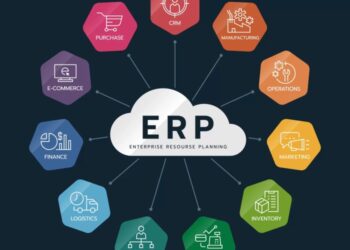Delving into the world of popular ERP systems, this introductory paragraph aims to provide a captivating overview of the key aspects surrounding these essential tools for modern businesses. From defining ERP systems to highlighting their significance across various industries, this guide sets the stage for an insightful journey into the realm of enterprise resource planning.
Overview of ERP Systems
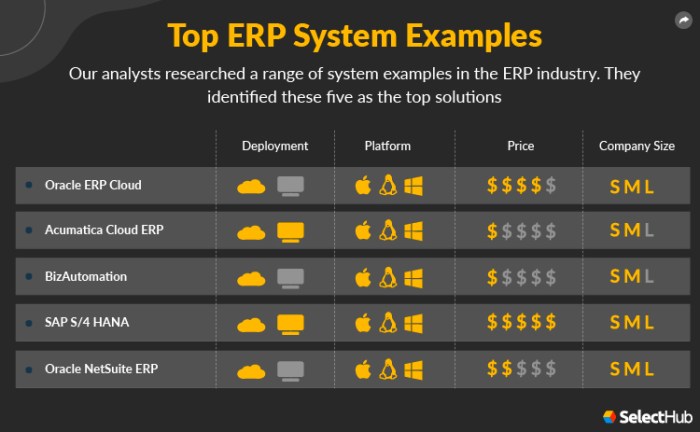
ERP systems, or Enterprise Resource Planning systems, are software applications that help organizations manage and integrate their core business processes. These systems allow for the flow of information across departments, enabling better decision-making, improved efficiency, and overall business growth.ERP systems typically include modules for functions such as finance, human resources, inventory management, customer relationship management, and supply chain management.
By centralizing data and automating processes, ERP systems streamline operations and provide a comprehensive view of the organization's performance.
Importance of ERP Systems in Modern Businesses
ERP systems play a crucial role in modern businesses by providing real-time insights, enhancing collaboration between departments, and facilitating compliance with regulations. These systems help organizations adapt to changing market conditions, improve customer satisfaction, and drive innovation through data-driven decision-making.
- Improved Efficiency: ERP systems automate manual tasks, reducing errors and saving time.
- Better Decision-Making: Access to accurate and up-to-date data allows for informed decision-making at all levels of the organization.
- Enhanced Visibility: ERP systems provide a holistic view of operations, enabling better planning and resource allocation.
- Scalability: ERP systems can grow with the organization, supporting expansion into new markets and product lines.
Examples of Industries Using ERP Systems
ERP systems are commonly used in industries such as manufacturing, retail, healthcare, and financial services. These sectors benefit from the integration of processes, improved inventory management, and enhanced customer service that ERP systems provide.
- Manufacturing: ERP systems help manufacturers optimize production processes, manage inventory efficiently, and meet customer demand.
- Retail: Retailers use ERP systems to track sales, manage inventory levels, and analyze customer data to improve marketing strategies.
- Healthcare: ERP systems in healthcare streamline patient care processes, manage medical records, and ensure compliance with regulations.
- Financial Services: ERP systems enable financial institutions to manage risk, comply with regulations, and provide personalized services to clients.
Popular ERP Systems in the Market
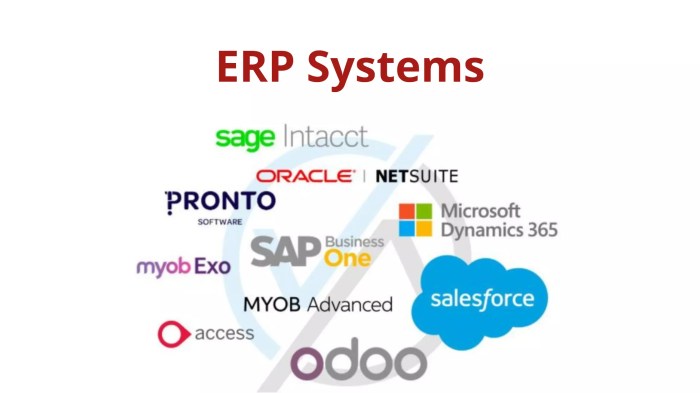
When it comes to Enterprise Resource Planning (ERP) systems, there are several popular options available in the market that cater to the diverse needs of businesses. These ERP systems offer a wide range of features and capabilities to streamline processes and enhance efficiency.
List of Widely Used ERP Systems:
- SAP ERP:SAP is one of the most widely used ERP systems globally, known for its robust capabilities in various industries. It offers modules for finance, human resources, supply chain management, and more.
- Oracle ERP Cloud:Oracle provides a comprehensive cloud-based ERP solution that integrates various business functions such as financial management, procurement, project management, and more. It is known for its scalability and flexibility.
- Microsoft Dynamics 365:Microsoft Dynamics 365 offers a suite of ERP applications that cover areas like finance, sales, customer service, and operations. It is known for its user-friendly interface and seamless integration with other Microsoft products.
Comparison of Features and Capabilities:
| ERP System | Key Features | Capabilities |
|---|---|---|
| SAP ERP | Advanced analytics, real-time insights, extensive customization options | Scalable for small to large enterprises, industry-specific solutions |
| Oracle ERP Cloud | Cloud-based deployment, mobile access, automated workflows | Adaptable for various industries, strong financial management capabilities |
| Microsoft Dynamics 365 | Unified platform, AI-driven insights, seamless integration | Flexible deployment options, customizable modules, strong CRM functionality |
Scalability for Different Business Sizes:
Each of the popular ERP systems discussed above offers scalability options for businesses of varying sizes:
- Small Enterprises:These ERP systems provide scaled-down versions with essential features to meet the needs of small businesses without overwhelming complexity.
- Medium Enterprises:Mid-sized businesses can benefit from the customizable modules and capabilities offered by these ERP systems to streamline operations and facilitate growth.
- Large Enterprises:For large corporations, these ERP systems offer robust features, advanced analytics, and scalability to manage complex operations and multiple business units effectively.
Implementation Process of ERP Systems
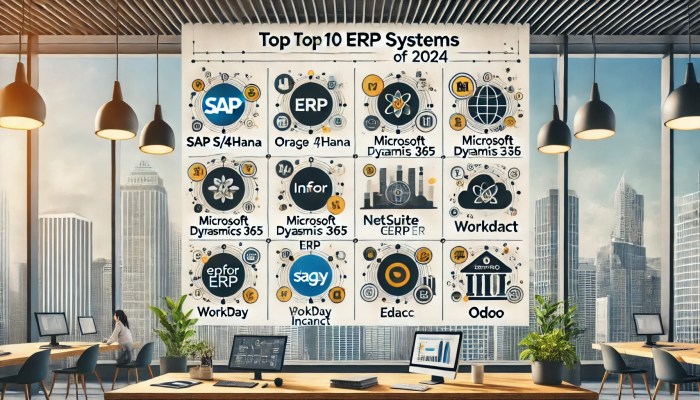
Implementing an ERP system involves several key steps that organizations need to follow in order to successfully integrate the system into their operations
.Steps involved in Implementing an ERP System
- Planning: Define the scope, objectives, and requirements of the ERP system implementation.
- Selection: Choose the right ERP software that aligns with the organization's needs and goals.
- Design: Customize the ERP system to meet the specific processes and workflows of the organization.
- Development: Build and configure the ERP system based on the design specifications.
- Testing: Conduct thorough testing to ensure the ERP system functions correctly and meets the organization's requirements.
- Training: Provide training to employees on how to use the ERP system effectively.
- Deployment: Roll out the ERP system across the organization and monitor its performance.
- Support: Provide ongoing support and maintenance to ensure the ERP system continues to operate smoothly.
Challenges Organizations May Face during ERP System Implementation
- Resistance to Change: Employees may resist adopting new processes and technologies.
- Data Migration: Transferring data from legacy systems to the new ERP system can be complex and time-consuming.
- Customization: Balancing the need for customization with the risk of overcomplicating the system.
- Integration: Ensuring seamless integration with existing systems and software.
- Cost Overruns: Budgeting for implementation costs and avoiding unexpected expenses.
Tips for Successful ERP System Implementation
- Gain Executive Support: Secure buy-in from top management to drive the implementation process.
- Communicate Effectively: Keep employees informed and engaged throughout the implementation.
- Set Realistic Goals: Define clear objectives and milestones to track progress.
- Train Users Adequately: Invest in comprehensive training to ensure users can effectively utilize the ERP system.
- Monitor Performance: Regularly evaluate the system's performance and address any issues promptly.
Customization and Integration Capabilities
When it comes to ERP systems, customization plays a crucial role in adapting the software to meet specific business needs. Businesses often have unique processes and requirements that can't be fully addressed by off-the-shelf solutions. ERP systems offer the flexibility to customize modules, workflows, reports, and interfaces to align with the organization's operations.
Integration capabilities are equally important as they allow ERP systems to communicate with other software applications within the organization's IT ecosystem. This seamless integration streamlines data flow, eliminates manual data entry, and ensures consistency across different systems.
Customization of ERP Systems
- Customizing modules to match specific business processes and workflows.
- Adapting reports to reflect the KPIs and metrics important to the organization.
- Personalizing user interfaces to enhance user experience and productivity.
Integration with Other Software Applications
- Integrating ERP systems with CRM software to unify customer data and improve customer service.
- Connecting ERP with inventory management systems for real-time updates on stock levels.
- Linking ERP with e-commerce platforms for seamless order processing and inventory management.
Successful ERP system integrations have resulted in significant benefits for businesses, such as improved efficiency, reduced costs, enhanced data accuracy, and better decision-making capabilities. By customizing and integrating ERP systems effectively, organizations can optimize their operations and stay competitive in their respective industries.
Final Conclusion
In conclusion, the discussion on popular ERP systems has shed light on their pivotal role in streamlining business operations and fostering growth. With a diverse range of features and capabilities, these systems offer scalable solutions for organizations of all sizes.
Exploring customization, integration, and implementation processes, it's evident that ERP systems are integral to driving efficiency and success in today's dynamic business landscape.
FAQ Explained
Can ERP systems be tailored to specific business needs?
Yes, ERP systems can often be customized to meet the unique requirements of different businesses, ensuring optimal functionality and efficiency.
Which industries commonly use ERP systems?
Industries such as manufacturing, retail, healthcare, and finance are known to frequently utilize ERP systems to enhance their operational processes.
What are some challenges organizations may face during ERP system implementation?
Common challenges include data migration issues, employee resistance to change, and the need for extensive training to adapt to the new system.

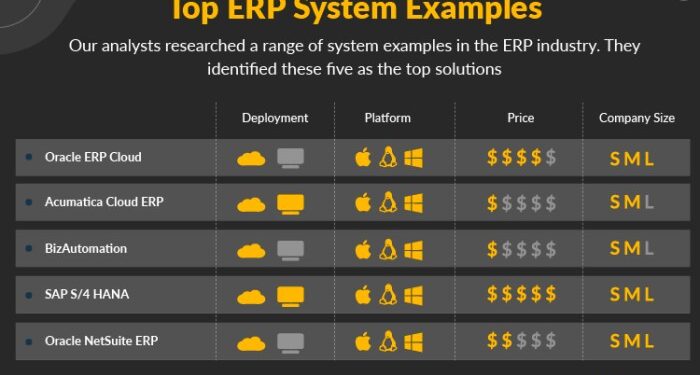






![Best Construction ERP Software [2024 Edition]](https://health.bandungnews.id/wp-content/uploads/2025/10/Top-10-Best-Construction-ERP-Software-to-Use-in-2024-1-120x86.jpg)


